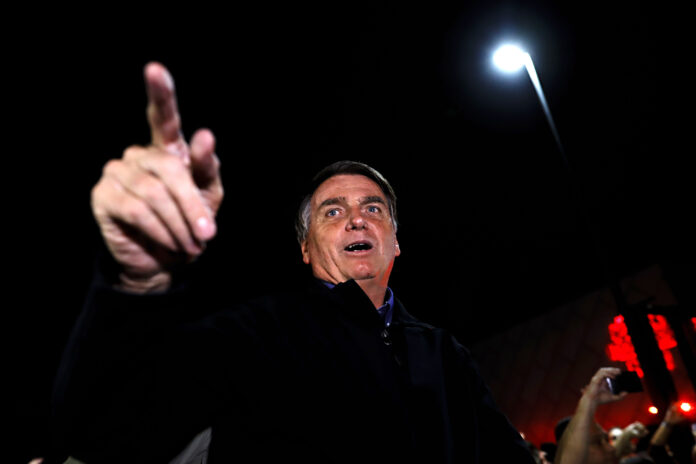Brazilians head to the polls on Sunday for a first round of voting that could mark the beginning of the end for Brazilian President Jair Bolsonaro — and experts are growing increasingly concerned he won’t go without a fight.
The right-wing firebrand is expected to lose to popular leftist former president Luiz Inácio Lula da Silva, widely known as Lula, in the first round. If no candidate wins more than 50 per cent of the vote, a runoff set for Oct. 30 is likely to further solidify da Silva’s victory.
But Bolsonaro, who has trailed in the polls throughout the campaign, has indicated he will not accept this outcome, telling his millions of supporters in June they “will go to war” if he loses. He has also repeatedly attacked the country’s election system, claiming without evidence that officials are aligned against him and that electronic voting machines are prone to fraud.
On Wednesday, Bolsonaro’s party released a document alleging officials within the government have the “absolute power to manipulate election results without leaving a trace.” The claim was not backed by evidence and was called “false and dishonest” by the national electoral authority.
The document’s release, which is now under investigation by Brazil’s Supreme Court, marks the latest escalation in an already violent campaign. Several Lula supporters and at least one Bolsonaro backer have been killed in recent months.
Experts say Bolsonaro’s rhetoric threatens to incite Brazil’s own version of the Jan. 6, 2021, attack on the U.S. Capitol by supporters of then-president Donald Trump, who were also led to believe in a “stolen” election despite no evidence.
“The fear is two-fold: what will Bolsonaro do as leader of the government, of the military, but also what will his supporters do on a societal level?” said Manuel Balan, a professor of political science at McGill University who studies Latin America.
A woman walks past signs that read in Portuguese: “End the Agony, Bolsonaro Out,” in Rio de Janeiro, Brazil, Friday, Sept. 30, 2022. Brazil’s general elections are scheduled for Oct. 2. (AP Photo/Matias Delacroix).
Elected in 2018, Bolsonaro has divided the public over his conservative agenda, which has done little to raise millions out of poverty as he promised while also attracting negative attention for sexist and racist comments.
Under his watch, deforestation of the Amazon rainforest — critical to global health — has accelerated after his administration cut environmental regulations and weakened Indigenous land claims, leading to more than a thousand fires a day last month and nearly a million hectares burned over the past year. Loggers are able to escape fines with virtually no inspectors to enforce them.
Bolsonaro further weakened his standing with his response to the COVID-19 pandemic. He dismissed the virus as “a little flu,” — only to be infected himself twice — opposed health restrictions and was slow to adopt vaccines. The death toll in Brazil ultimately rose to the second highest in the world, with over 685,000 lives lost.
Trending Stories
Records from Trump White House staffers remain missing: National Archives
Milk mystery: As prices soar, dairy farmers plead poverty
Brazil surpasses 500,000 COVID-19 deaths as people protest in streets – Jun 19, 2021
Da Silva served as president from 2003 to 2010 and is remembered for introducing a series of social programs that are credited with expanding the middle class and boosting the national economy.
In 2017, he was convicted on corruption and money laundering charges, and he spent nearly 20 months in prison after being barred from challenging Bolsonaro in the 2018 election. His charges were ultimately annulled last year by the Supreme Court, which found the judge in the case was politically biased.
Da Silva’s immediate popularity upon entering this year’s race shows much of the public has forgiven him, experts say.
“Brazilians understand (da Silva’s conviction and imprisonment) was a politically motivated attempt to derail his campaign to allow Bolsonaro to win,” said Max Cameron, a political science professor at the University of British Columbia.
Meanwhile, the case is increasingly being made that a victory for da Silva would benefit not just Brazil, but the planet. A new study found Amazon forest loss would drop 89 per cent if Bolsonaro is defeated.
The latest polls show da Silva’s lead over Bolsonaro is within reach of taking half of all votes cast on Sunday with a healthy lead over Bolsonaro.
Yet the possibility remains that da Silva could fall just short of 50 per cent, sending the two frontrunners to a runoff in four weeks — a time that could see further unrest.
Bolsonaro has spent months preparing his supporters to doubt the first-round results, saying in an interview last month that if he doesn’t win outright by at least 60 per cent of the vote, “it is because something abnormal has happened.”
“I have three alternatives for my future: being arrested, killed or victory,” Bolsonaro told evangelical leaders in August.
Da Silva has taken to wearing bulletproof vests at campaign rallies, while federal police officers tasked to guard him have called for backup over fears of “radicalized opponents.”



